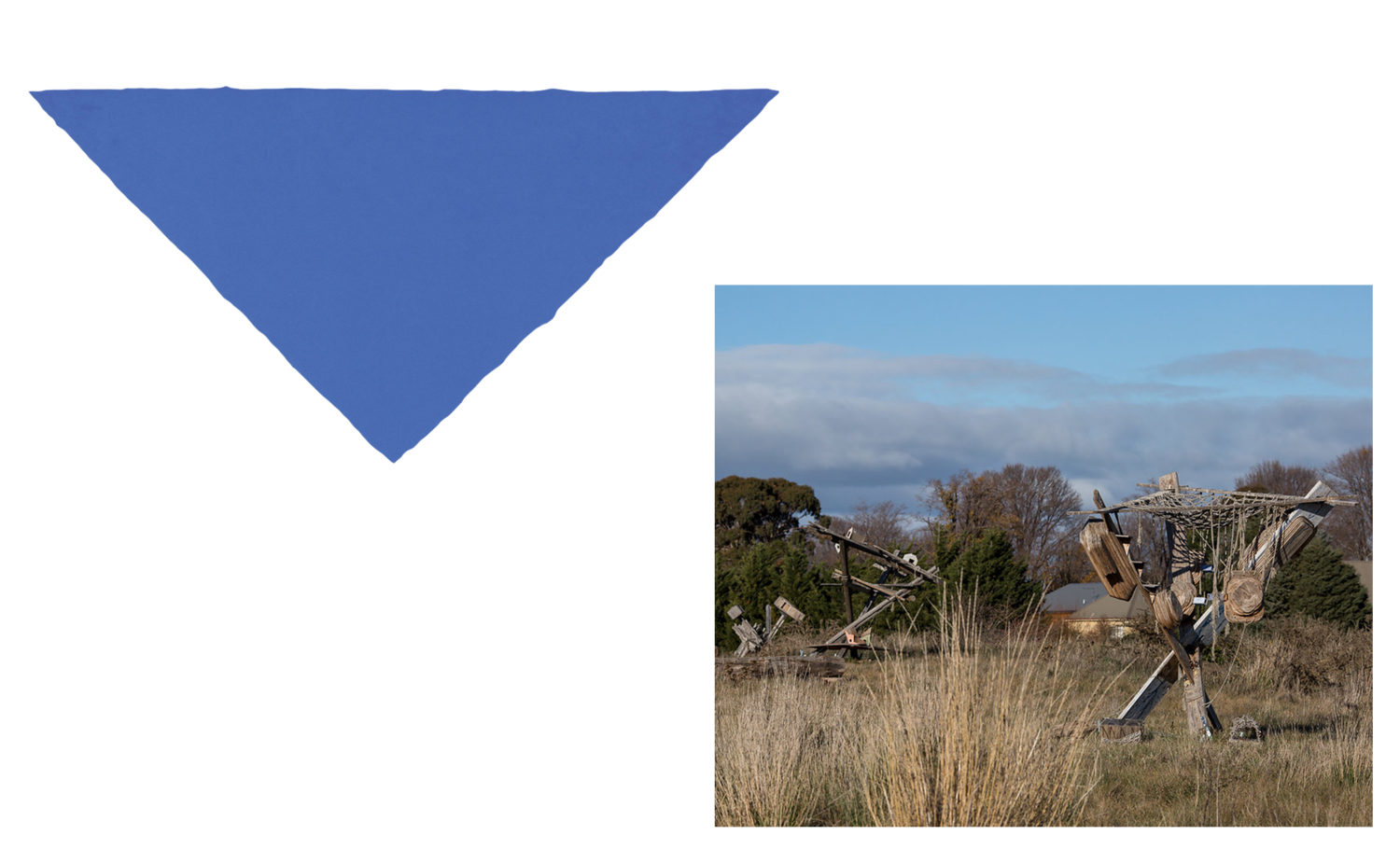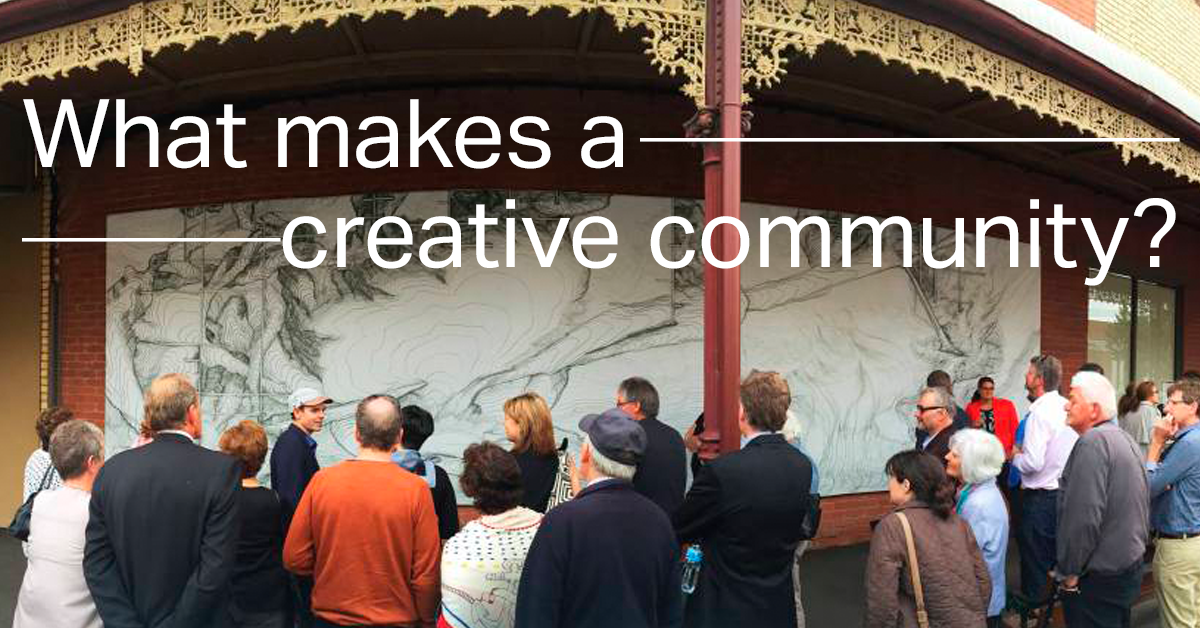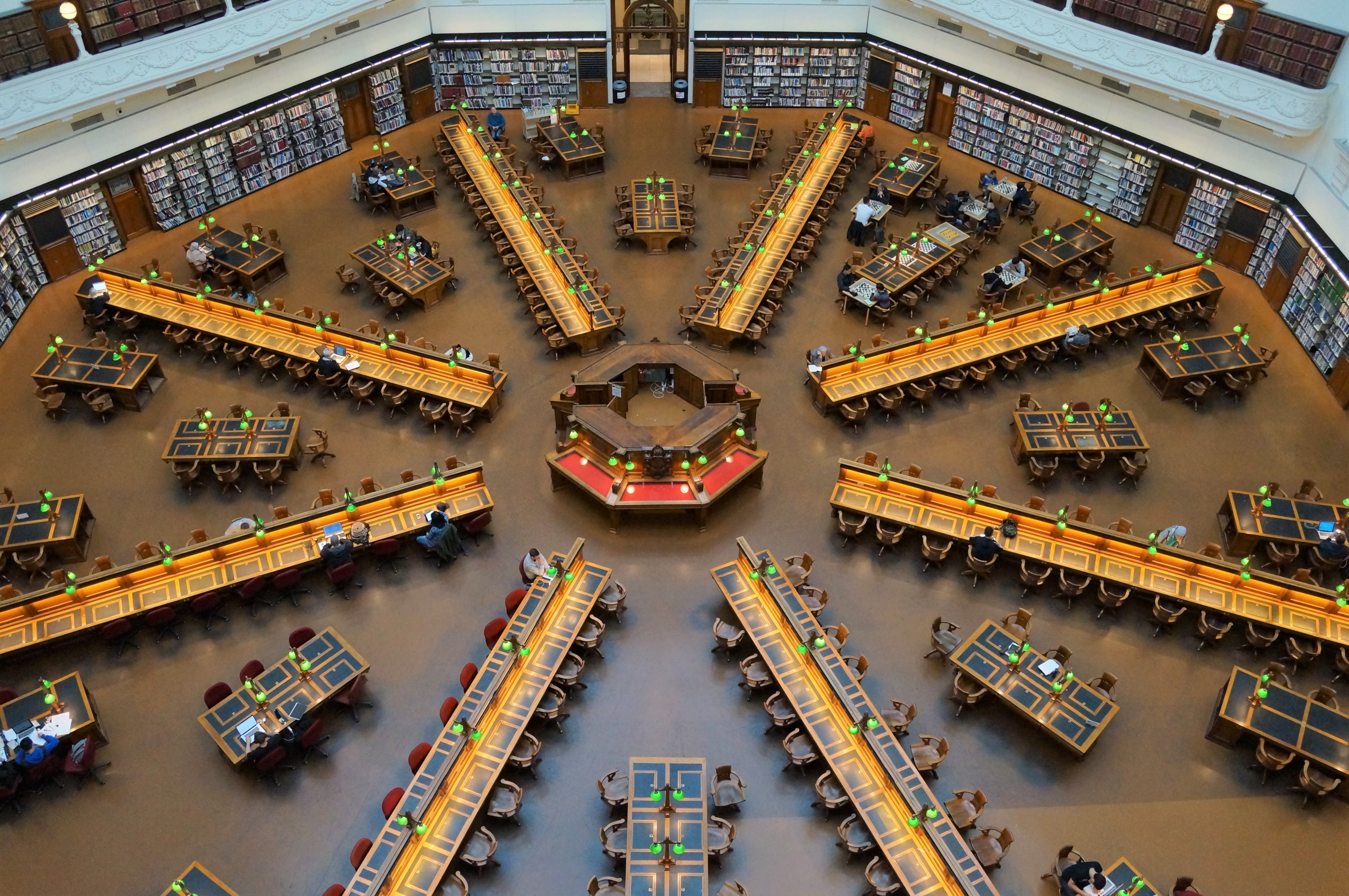Search results
Projects
Cultural Value and Impact Network (CVIN)
Interdisciplinary Collaboration and Inventive Methods

The Cultural Value and Impact Network (CVIN) is building RMIT University’s expertise in interdisciplinary collaboration and inventive methods for articulating, measuring, evaluating cultural value and social impact. With practitioners and academics from across the University, we are building strong creative teams that use new interdisciplinary methods attuned to cultural complexity and diverse communities to enable high impact research partnerships with the arts and cultural sectors, government and NGO community. We have been mapping the capabilities with our colleagues in Art, Economics, Education, Finance and Marketing, Global Urban Studies, Media and Communication, Design, Architecture, and affiliates of DCP ECP, Global Business and Innovation and Social Change. We have collated existing research methods and industry projects through a survey and interviews to identify existing approaches, drivers, current gaps, and future interdisciplinary methodological possibilities for student training and partnerships.
Find out more about the Cultural Value and Impact Network [CVIN.
If you would like to get involved with this project, fill out the form below or reach out to project leaders via the contact info provided alongside each bio.
People
Bronwyn Coate
Senior Lecturer
School: Economics, Finance and Marketing
Dr Bronwyn Coate is a Senior Lecturer in the School of Economics, Finance and Marketing who specialises in cultural economics. Bronwyn’s research involves economic analysis of the arts and creative industries using a range of economic and experimental techniques including approaches from behavioural economics and behavioural science. Areas her research has focused upon include art markets, artists/cultural labour, and cultural/creative industries. Much of Bronwyn’s research is undertaken within mult-idisciplinary teams and focused upon addressing issues with policy relevance for the arts and cultural sector. Bronwyn is a member of a number of a number of research groups including the Cultural Value Impact Network (CVIN), Kinomatics Research Group, Behavioural Business Lab (BBL) and Placemaking Economics Research Group. She is also the current Secretary/Treasurer of the Association for Cultural Economics International (ACEI).
Gretchen Coombs
Post Doctoral Research Fellow
School: Design and Creative Practice
Gretchen Coombs is a Post Doctoral Research Fellow in the Design & Creative Practice Enabling Capability Platform at RMIT. She researches socially engaged art practices in the US, the UK and Australia, with a particular focus on how they are practiced in urban contexts. She’s a core member of the Cultural Value and Impact Network (CVIN) and contributes to Creative Care in the School of Art. Gretchen has a PhD in social and cultural anthropology and a MA in visual criticism: her writing uses a combination of ethnographic methods and visual analysis. She is a co-author of Creative Practice Ethnographies (Rowan & Littlefield 2019) and her monograph, The Lure of the Social: Encounters with Contemporary Artists (Intellect 2021 ) is an experimental ethnography about contemporary artists working at the intersection of art, aesthetics, and politics.
Kit Wise
Professor
School: School of Art
99252219
RMIT staff profile
kit.wise@rmit.edu.au
After graduating from Oxford University and the Royal College of Art with an MFA in Sculpture, Kit Wise received the Wingate Rome Scholarship in Fine Art in 1999, to study at the British School at Rome. He moved to Australia in 2002 and completed his PhD at Monash University in 2012.
Wise has held senior educational leadership and leadership and governance roles since 2008. He is a Board Member for Deans and Directors of Creative Arts (DDCA) and Deputy Chair of the Executive Council of the Australian Council of University Art and Design Schools (ACUADS).
He is Professor of Fine Art and Dean of the School of Art at the RMIT University; and an Adjunct Professor at Monash University and the University of Tasmania. He is represented by Sarah Scout Presents, Melbourne and continues to practice as an artist, art writer and curator.
Creative Ecologies

Creative Ecologies is a collaborative investigation into what makes Australia’s creative landscapes tick. The aim is to understand what it takes to build thriving creative communities and then develop tools to foster their growth.
The goal of the project is to develop a simple way of articulating the complex ways creative ecologies operate. Core to this will be highlighting connections to the wider society and demonstrating value beyond purely economic indicators. The long-term ambition of Creative Ecologies is to expand our understanding and appreciation of creative exertion – and have its central place in Australia’s national character recognised. It will do this by developing and raising awareness of a framework and resource for policymakers, practitioners and advocates. This will be a live, interactive visual map of the nation’s creative ecologies, combining data, case studies and avenues for connection across the sector.
The project began in late 2017 and the arising work and findings including a national survey, one-on-one consultations, interactive workshops were presented at the Engaging For Impact conference in February 2018. Creative Ecologies now has an expanded list of RMIT researchers on board
LEAD RESEARCHER
○Jan van Schaik, Senior Lecturer, School Architecture & Urban Design
SUPPORTING RESEARCHERS
○Marnie Badham, Vice Chancellor’s Postdoctoral Fellow, School of Art
○Bronwyn Coate, Senior Lecturer, Economics, Finance and Marketing
○Gretchen Coombs, Postdoctoral Fellow, DCP ECP
○Christine Phillips, Senior Lecturer, Architecture & Urban Design
○Professor Jason Potts, Economics, Finance and Marketing
○Noel Waite, Senior Lecturer, Communication Design
○ Professor Ellie Rennie, Digital Ethnography Research Centre
○Professor Mark Sanderson, Computer Science and Information Technology
You can find out more about CREATIVE ECOLOGIES here.
If you would like to get involved with this project, fill out the form below or reach out to project leaders via the contact info provided alongside each bio.
People
Jan van Schaik
Senior Lecturer
School: Architecture and Urban Design
Jan van Schaik is a practising architect at MvS Architects, a researcher and senior lecturer at RMIT Architecture & Urban Design, and a creative and cultural industries strategist at Future Tense. His is the leader of the ‘Culture and Society’ research stream, and a PhD superrvisor of established architects conducting post-professional reflective practice research. Jan is the founder of the WRITING & CONCEPTS lecture and publication series which reflects of the role that writing plays in visual arts practice. Jan is also one of the founders of Creative Ecologies„ a collaborative investigation into what makes Australia’s creative landscapes tick. The aim is to understand what it takes to build thriving creative communities and then develop tools to foster their growth.
Cultural Commonalities Memory Game
Increasing social inclusion through a game

Games teach us many things – how to play, how to strategize, and how to have fun with others. Yet, in our globalised world, people are increasingly exposed to individuals from different cultural backgrounds, and often people feel alienated from people and things that are unfamiliar. The Cultural Commonalities Memory Game (CCMG) might just be one way bridge across cultures and help people connect and belong.
Social inclusion is a key factor in fostering the benefits of a diverse society. Bringing together design, psychology and behavioural economics, the CCMG aims to increase social and reduce bias in intercultural contexts. Players categorise images associated with different cultures together in a common group, highlighting commonalities across cultures whilst keeping their differences apparent. The game is designed so that players feel valued in their own individuality and experience a sense of belonging to the world as a whole.
More from the RMIT Behavioural Business Lab.
If you would like to get involved with this project, fill out the form below or reach out to project leaders via the contact info provided alongside each bio.
People
Ananta Neelim
Lecturer
School: Economics, Finance, and Marketing
Ananta is a Lecturer in Economics specialising in Behavioural, Development and Experimental economics. His academic research focuses on the impact of social institutions (like gender norms) on individual decision making and behavioural effects of rewards. He has successfully published his work in top-tier economics journals such as the Journal of Economic Behaviour and Organization and Economics Letters. Ananta also has conducted multiple impact evaluation projects and has provided consultancy services to Plan International, World Bank, International Organization for Migration, Swiss Development Corporation and the Consumer Policy Research Centre. Ananta received his PhD from Monash University in 2014.
Claus-Christian Carbon
Professor
School: Department of General Psychology and Methodology, University of Bamberg
Claus-Christian Carbon studied Psychology (Dipl.-Psych.), followed by Philosophy (M.A.), both at the University of Trier, Germany. After receiving his PhD from the Freie Universität Berlin and his “Habilitation” at the University of Vienna, Austria, he worked at the University of Technology Delft, Netherlands and the University of Bamberg, Germany, where he currently holds a full professorship leading the Department of General Psychology and Methodology and the “Forschungsgruppe EPAEG” — a research group devoted to enhancing the knowledge, methodology and enthusiasm in the fields of cognitive ergonomics, psychological aesthetics and Gestalt (see www.experimental-psychology.com and www.epaeg.de for more details). He is the author of more than 400 publications including more than 160 peer-reviewed international journal articles, mainly addressing aesthetics topics, has conducted more than a dozen research projects with a total budget amount of approx. €3 million and a renowned contributor and invited speaker on international research conferences. CCC is Editor-in-Chief of the scientific journal Art & Perception, Section Editor of Perception and i-Perception, Associate Editor of Frontiers in Psychology, Frontiers in Neuroscience and Advances in Cognitive Psychology and a member of the Editorial Boards of Open Psychology, Musicae Scientiae and Leadership, Education and Personality.
Jan Schoormans
Professor
School: Faculty of Industrial Design Engineering, Delft University of Technology
Dr. Jan Schoormans (1956) is a Professor of Consumer Behaviour at the Faculty of Industrial Design Engineering, Delft University of Technology, Delft, the Netherlands. His research focuses on consumer preferences and behavior towards (the design of) new products. He has published on these topics in marketing journals like the International Journal of Research in Marketing, Psychology and Marketing, the Journal of Product Innovation Management, in psychological journals like Perception and the British Journal of Psychology, in engineering journals like Applied Energy, Journal of Cleaner Production, and in design journals like Design Studies, Journal of Engineering Design and the Design Journal.
Janneke Blijlevens
Senior Lecturer
School: Economics, Finance, and Marketing
Janneke Blijlevens is a Senior Lecturer in Design Thinking and Experimental Methods within the Marketing Discipline. With a Masters in Psychology, a PhD in consumer behaviour and design, and work experience in both design and business schools her research is truly interdisciplinary. Janneke uses her ability to understand different ways of thinking to design innovative solutions to complex societal and business problems. Her approach uses behavioural insights obtained in both qualitative and quantitative research to affect positive behaviour change in society. Her research covers areas such as product (design) perception and evaluation by consumers, the social roles that products can play to consumers, how to design products for social change, and psychological factors influencing the adoption of highly innovative products by consumers. She has published in top-tier academic journals such as Psychology & Marketing, International Journal of Design, Acta Psychologica, British Journal of Psychology, Journal of Psychology in Aesthetics, Creativity, and Arts, and Journal of Design, Business and Society. The project ‘Sans Forgetica, a font to remember (sansforgetica.rmit)’ gained world-wide acclaim.
Joanne Peryman
Lecturer
School: Economics, Finance, and Marketing
Joanne Peryman (Laban) is a Lecturer in Economics. She holds a PhD in Economics from the University of Exeter, a Masters in Behavioural Economics from the University of Nottingham, and a BCom (Hons) in Economics from the University of Canterbury. Using mainly experimental methods, Jo’s research focuses on cultural differences in decision making, especially in situations involving uncertainty or risk. She has presented the results from this work at conferences in the UK, The Netherlands, and China. Jo is also keen to apply behavioural insights to policy. During her PhD she completed an internship with a UK Government Department, where she applied ideas from behavioural economics to real-life problems. Her work has attracted funding from the UK’s Economic and Social Research Council, as well as numerous small grants from the University of Exeter’s Behaviour, Decisions and Markets Research Centre.
Johanna Prasch
School: Economics, Finance and Marketing
Johanna E. Prasch is a PhD student and a research assistant and tutor in the School of Economics, Finance and Marketing and the BBL. After completing her Bachelors in Psychology from the University of Regensburg, and her Masters in Psychology from the University of Bamberg (both Germany), she started her PhD program in the BBL in February 2018. For her PhD project in consumer behaviour, Johanna got awarded a Stipend Scholarship from RMIT University. Her research interests centre around combining experimental methods from psychology and consumer behaviour to investigate mechanisms behind intercultural communication and behaviour. Currently, Johanna is investigating how to increase social inclusion and cooperation in multicultural settings.
News and updates
No results
People

Dr. Jan Schoormans (1956) is a Professor of Consumer Behaviour at the Faculty of Industrial Design Engineering, Delft University of Technology, Delft, the Netherlands. His research focuses on consumer preferences and behavior towards (the design of) new products. He has published on these topics in marketing journals like the International Journal of Research in Marketing, Psychology and Marketing, the Journal of Product Innovation Management, in psychological journals like Perception and the British Journal of Psychology, in engineering journals like Applied Energy, Journal of Cleaner Production, and in design journals like Design Studies, Journal of Engineering Design and the Design Journal.

Janneke Blijlevens is a Senior Lecturer in Design Thinking and Experimental Methods within the Marketing Discipline. With a Masters in Psychology, a PhD in consumer behaviour and design, and work experience in both design and business schools her research is truly interdisciplinary. Janneke uses her ability to understand different ways of thinking to design innovative solutions to complex societal and business problems. Her approach uses behavioural insights obtained in both qualitative and quantitative research to affect positive behaviour change in society. Her research covers areas such as product (design) perception and evaluation by consumers, the social roles that products can play to consumers, how to design products for social change, and psychological factors influencing the adoption of highly innovative products by consumers. She has published in top-tier academic journals such as Psychology & Marketing, International Journal of Design, Acta Psychologica, British Journal of Psychology, Journal of Psychology in Aesthetics, Creativity, and Arts, and Journal of Design, Business and Society. The project ‘Sans Forgetica, a font to remember (sansforgetica.rmit)’ gained world-wide acclaim.

Dr Bronwyn Coate is a Senior Lecturer in the School of Economics, Finance and Marketing who specialises in cultural economics. Bronwyn’s research involves economic analysis of the arts and creative industries using a range of economic and experimental techniques including approaches from behavioural economics and behavioural science. Areas her research has focused upon include art markets, artists/cultural labour, and cultural/creative industries. Much of Bronwyn’s research is undertaken within mult-idisciplinary teams and focused upon addressing issues with policy relevance for the arts and cultural sector. Bronwyn is a member of a number of a number of research groups including the Cultural Value Impact Network (CVIN), Kinomatics Research Group, Behavioural Business Lab (BBL) and Placemaking Economics Research Group. She is also the current Secretary/Treasurer of the Association for Cultural Economics International (ACEI).

Hardik Bhimani is a PhD student in the School of Economics, Finance and Marketing and is concurrently completing a Graduate Diploma in Psychology at Monash University. Hardik holds a Masters in Applied Finance from Kaplan Business School (Sydney) and is a member of the prestigious Strategic Management Society.
“Managers face many strategic decisions but they often make unsustainable choices. So the challenge for todays’ firms is – how to effectively make social, environmental and economic choices?”
Prior to joining RMIT, where Hardik currently teaches Strategic Management courses, he was an award winning strategist and subject matter expert at several multinational organisations. It was during this period that he cultivated a curiosity for behavioural strategy. Ultimately, the quest to advance his research found him a ‘home’ at RMIT University’s Behavioural Business Lab.
“The access to supportive supervisors and a team of like-minded critical thinkers means the research journey is not only pleasant, but also engaging.”
Hardik’s research aims to understand the micro foundations of the interplay between social, environmental and economic strategic choices. His mixed-method research takes a behavioural strategy perspective and explains psychological influences, which affect strategic decision-making. In turn, the findings could guide managers’ to effectively de-bias their decision-making process, for a more sustainable strategic choice.

Johanna E. Prasch is a PhD student and a research assistant and tutor in the School of Economics, Finance and Marketing and the BBL. After completing her Bachelors in Psychology from the University of Regensburg, and her Masters in Psychology from the University of Bamberg (both Germany), she started her PhD program in the BBL in February 2018. For her PhD project in consumer behaviour, Johanna got awarded a Stipend Scholarship from RMIT University. Her research interests centre around combining experimental methods from psychology and consumer behaviour to investigate mechanisms behind intercultural communication and behaviour. Currently, Johanna is investigating how to increase social inclusion and cooperation in multicultural settings.

Ananta is a Lecturer in Economics specialising in Behavioural, Development and Experimental economics. His academic research focuses on the impact of social institutions (like gender norms) on individual decision making and behavioural effects of rewards. He has successfully published his work in top-tier economics journals such as the Journal of Economic Behaviour and Organization and Economics Letters. Ananta also has conducted multiple impact evaluation projects and has provided consultancy services to Plan International, World Bank, International Organization for Migration, Swiss Development Corporation and the Consumer Policy Research Centre. Ananta received his PhD from Monash University in 2014.

Joanne Peryman (Laban) is a Lecturer in Economics. She holds a PhD in Economics from the University of Exeter, a Masters in Behavioural Economics from the University of Nottingham, and a BCom (Hons) in Economics from the University of Canterbury. Using mainly experimental methods, Jo’s research focuses on cultural differences in decision making, especially in situations involving uncertainty or risk. She has presented the results from this work at conferences in the UK, The Netherlands, and China. Jo is also keen to apply behavioural insights to policy. During her PhD she completed an internship with a UK Government Department, where she applied ideas from behavioural economics to real-life problems. Her work has attracted funding from the UK’s Economic and Social Research Council, as well as numerous small grants from the University of Exeter’s Behaviour, Decisions and Markets Research Centre.
